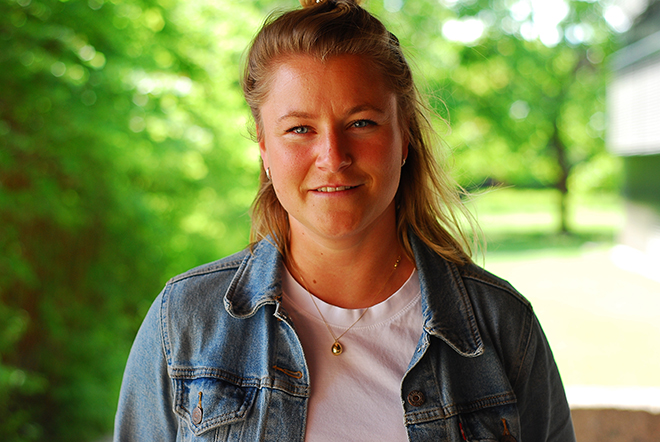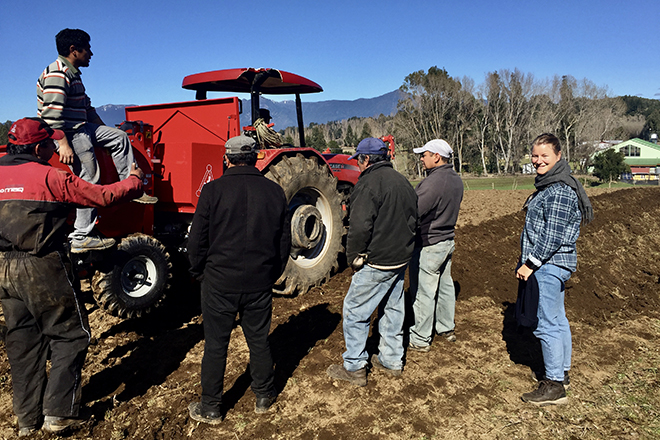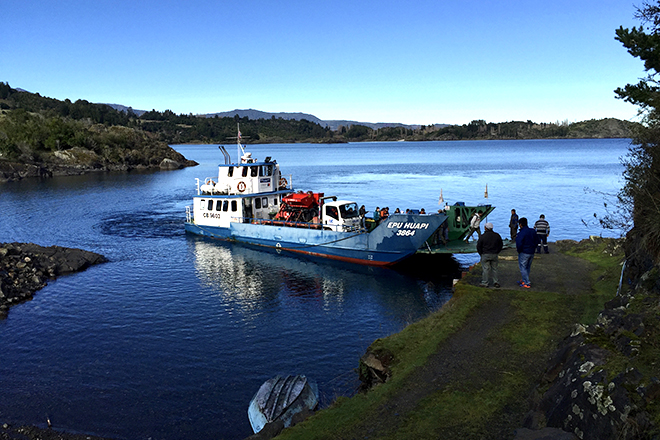When Martine Greek first arrived on Isla Huapi, an island in a lake half-way between the Chilean Pacific coast and the mountainous border with Argentina, she had just given up her doctoral project. Greek travelled to Chile in order to conduct research on renewable sources of energy in private homes, where new legislation was enabling Chileans to sell surplus electricity to the national grid, as well as produce it for their own consumption.
“The problem was that the scheme was not profitable enough for people to actually start investing in it. I only discovered that after I arrived there,” says Greek.
Since she was still curious about energy issues and wanted to study the Chileans’ somewhat erratic and ambivalent relationship with the government, Greek paid a visit to the Chilean Ministry of Energy. where she learnt that renewable energy investments were often related to agriculture, primarily in rural areas.
One of the main projects at the time was being conducted on an inland island.
“That’s how I ended up on Isla Huapi,” says Greek.
The day she arrived the anthropologist was shown around by the head of the irrigation office.
“He introduced me to the authorities on the island to whom I would need to address my request for permission to conduct research there. Fortunately it went well and I stayed there for twelve months,” says Greek.

Hesitant and sceptical
This flat Chilean island has around 500 inhabitants and a climate similar to that in Norway. Most of the island’s residents are farmers and belong to the Mapuche people, the largest group of indigenous people in Chile, who, according to Martine Greek, do not regard themselves as being one group of people, but many groups which are not necessarily allied with each other.
Without having an established network or a pre-defined strategy, Greek needed to gain a foothold among the Mapuche people. She therefore started going for walks. Lots of walks.
“Since the conditions were so limited I thought it would be easy to get in touch with people”, says Greek.
But it wasn’t. It turned out that many people were hesitant and sceptical about the rambling anthropologist.
“It was actually very difficult to talk to people,” says Greek.
“Throughout history the Mapuche people have experienced a lot of discrimination and violence at the hands of European settlers and white Chileans. They have had to preserve what is theirs, and I had the feeling that people were avoiding me and keeping a lot of secrets, especially about more personal subjects, such as questions about traditional religious practices,” she says.
Love chatting
However, after four months of patiently showing her presence, the residents of the island became used to seeing Martine Greek. She had gradually managed to become part of everyday life on Isla Huapi, and the people finally started to open up.
“The people I met suddenly started to invite me in for a chat and to drink tea, a herbal tea drunk by the Mapuche people. It was a big step forwards. After a while I was told by an informant that many people on the island are also reserved because they are ashamed about their poverty and about having dirty, ugly homes,” says Ms Greek.
After that Ms Greek was involved in most things that happened on the island. She attended municipal meetings, inspections with engineers from the Ministry of Energy. She attended school events, visited the sick and attended funerals, religious rituals and workshops.
“Isla Huapi is a small island where there wasn’t usually much happening. However, when something did happen, particularly if was related to energy projects and development programmes, I was there. Otherwise most of my research was conducted in the homes of the people. In particular I helped the women with their cooking, childcare and household tasks. We often sat around the wood-fired stove and talked. It turned out that the islanders loved chatting,” she says.

The Chilean experiment
While sitting round the wood-fired stove Martine Greek learned about ancient rituals; about the children being bullied at school on the mainland – because they were Mapuche; about a race which was fed up with poverty and, like most Chileans, longed for their share of Chilean progress.
After Augusto Pinochet assumed power from the socialist President Salvador Allende in 1973 following a coup d’état, market liberalism gained momentum in Chile. According to Greek, the aggressive neo-liberalisation of society, which was imposed by Pinochet’s military regime and lasted until 1990, was called the Chilean experiment. Never before had anyone surgically tried to establish an economy and policy based on the neo-liberalist ideas of people like Milton Friedman.
“That was before Thatcher, before Reagan. Their class society was modernised and industrialised in record time, opponents were imprisoned and tortured, individualism eradicated collectivism,” says Greek.
As a consequence, Chile became Latin America’s strongest economy and can boast solid growth in many sectors. According to Greek, the country is also regarded as being the continent’s most stable democracy. At the same time, inequality is higher in Chile than in the other OECD countries, and is among the highest in Latin America.
“For a long time the government has been trying to rectify the disparities by implementing a number of measures designed to address poverty. The development programmes I have written about in my thesis is one of these,” says Greek.
Neo-liberalist paradox
Government development programmes designed to even out social inequality, with a neo-liberal design. That might sound like a paradox. Martine Greek points out that there is always a difference between executive policy and ideology.
“Negotiations take place in executive policy, but the ideology remains the same,” says Greek.
Several of the residents of Isla Huapi are now participating in government development programmes. Poverty on the island is widespread.
“The farmers on the island are receiving crash courses in English and on how they can set up a tourist industry. They are being offered microfinancing in order to set up cottages, like the one I lived in, and build greenhouses for growing locally produced organic food for tourists. The people who live there are also being advised to capitalise on their Mapuche identity,” says Greek.
Labels on unbleached paper
In this way, the residents of Isla Huapi are becoming involved in the government’s programme regime, where one development programme leads to another. Their capacity to borrow is increasing all the time. According to Greek, the idea is for farmers to become entrepreneurs so that their businesses can grow until poverty has been eradicated.
Some are succeeding better than others, but those who are successful need to align themselves with the programme regime to the best of their abilities.
“One of the women who I have written about, Teresa, has been very successful with these programmes, partly because she commutes between Santiago and Isla Huapi. She has a network which many of the other Mapuche residents on Isla Huapi do not have. Teresa is probably also more dynamic and target-driven that average,” says Greek.
Greek says that this women rents out accommodation to tourists and makes jam from original Isla Huapi berries which she takes to Santiago and sells jam jars with grey labels made from unbleached paper at one of the markets there.
“Teresa has understood how the game works. From a neo-liberal point of view you could say that she is successful,” says Greek.
Because the ferry is the only link between the island and the mainland, where the supermarket, etc. are located, Greek says that it is very obvious who has money and who does not. On the ferry it is difficult to hide who has bought what and how much. The development programmes have resulted in increased welfare for some people, but also greater social inequality.
“Teresa has also had more exclusive solar panels installed on her roof under another government programme. One of my informants reacted by saying that Teresa is starting to forget where she comes from,” says Greek.

The ethnography of hope
Martine Greek says that the slogan for the Mapuche people is “somos iguales”, or “here we are equal”, a basic attitude towards life.
“Being relatively poor has been part of the Mapuche identity. In some areas this culture is on a direct collision course with neo-liberal ideals about being the master of one’s own destiny,” says Greek.
In order to be able to criticise neo-liberalist ideas and the system of neo-liberalism, she has wanted to understand why the Mapuche people are finding hope in these government programmes. She wants to study hope as an empirical object.
“I am interested in looking for hope as it manifests itself in the Mapuche people. Much of what has been written about neo-liberalism in anthropology is very critical, as I have also been in during my research by pointing out the exploitation and injustice that neo-liberalism brings with it,” says Greek.
“However, if we don’t recognise hope as an empirical object, that people who live under neo-liberal regimes live with a hope which drives them and the system forwards, then we can’t understand either why neo-liberalism is successful in making people believe in a better future,” she says.
The anthropologist believes that it is dangerous not to take seriously the hows and whys of when people associate hope and happiness with materialistic development.
“Critical objections about people fooling themselves are not taken seriously. If I was to criticise neo-liberalism, I would need to understand why it has been so resilient and how it is practiced every day. It is in this context that it has been important for me to understand the role of hope. The trend towards independence results in dependence, and this also applies to the Mapuche people on Isla Huapi,” says Greek.
